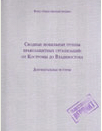
Article 10
November 29, 2006 08:01
1. Each State Party shall ensure that education and information regarding the prohibition against torture are fully included in the training of law enforcement personnel, civil or military, medical personnel, public officials and other persons who may be involved in the custody, interrogation or treatment of any individual subjected to any form of arrest, detention or imprisonment.
2. Each State Party shall include this prohibition in the rules or instructions issued in regard to the duties and functions of any such persons.
10.1. Since the Periodic Report of Russian Federation gives very general overview on the curricula for the law enforcement employees, we feel that additional information on this matter might be valuable.
10.2. There exist several types of educational programs for the law enforcement officers in Russian Federation:
10.3. Professional higher educational establishments: higher educational establishments aimed at training career officers for the Ministry of the Interior, Prosecutor’s Office, Federal Penitentiary Unit.
The curricula of those educational establishments do contain the course on Human Rights. This is an academic discipline, and the syllabus is mostly structured round the international treaties ratified by RF. The principle teaching method is in most cases lecturing, and final evaluation – either examination or pass/fail.
10.4. Liberal Arts Schools/Universities: mainly, Law Schools – or the Faculties of Law - the graduates of which are likely to be employed within the law enforcement system as well.
The curricula of those schools also include the course on Human Rights. As a rule, the teaching methods, number of academic hours and the syllabus is not much different from those of the professional schools. At the same time, a number of higher educational establishments is involved in the development and implementation of more academic courses that touch upon the issue of human rights and freedoms.
10.5. Learning Centers at law enforcement agencies
The main audience of the courses offered by the Learning Centers is mostly comprised of law enforcement interns and well as of the employees undergoing additional vocational training. In 2006 the Human Rights course entered the package of obligatory courses offered by the learning centers at Federal Penitentiary Unit. The teaching is usually carried out by guest lecturers from the local higher educational establishments (depending on the region). At Learning Centers of the Ministry of the Interior this course is not offered at all. Some regional Ministry of the Interior branches organize one-time events to increase human rights awareness, usually in cooperation with the human rights protection organizations. The learning centers in Perm and Maryi-El are good illustration to that.
10.6. Training programs carried out by intergovernmental and human rights protection organizations within the framework of joint projects aimed at increasing the legal competence in the law enforcement agencies
10.7. Such cooperation between the law enforcement agencies and intergovernmental structures with national and international human rights protection organizations in order to increase the quality of human rights courses for law enforcement staff is a very positive development.
10.8. The “Police and Human Rights” department of the Council of Europe organizes educational seminars at professional academies in the South of Russia under the umbrella of the Police and Interethnic Relations project. The Russian part of this project was launched in 2003.
10.9. The “Climate of Trust” project implemented by the Bay Area Council NGO and San-Francisco Police Department has been running in Russia for several years now. The aim of the program is experience exchange between the employees of judicial and law enforcement systems from California and their colleagues and representatives of public and non-governmental organizations of CIS (primarily Russia). In particular, the project provides with an opportunity to study the practical experience of police work with ethnical minorities and of public control of the activities of the police. The Russian police officers who had completed training and experience exchange mobilities within this program are encouraged to organize educational seminars on the work with ethnical minorities and public control for other employees of their units.
10.10. In 2003-2004 the non-governmental “Man and Law” of the city of Yoshkar-Ola created and tested a course in Human Rights for those employees of penitentiary system who regularly work with minors. The aim of the course was to increase awareness and prevent violations of Article 3 of the European Convention in relation to minors. Both the employees of penitentiary unit and inmate of the colony for minors received printed materials on human rights.
10.11. In 2005-2006 there were implemented other projects that employed the expertise of the human rights protection organizations. For example, regional NGO “Man and Law” is carrying out the “Prevention of Cruelty and Violence at Police Departments through Vocational Legal Training Program for Police Officers” project, which includes extended courses of law and psychology for the officers of Mariy El, Tatarstan and Nizhny Novgorod police departments.
10.12. Another NGO, “Center of Civil Education and Human Rights” implements a project on introducing the courses on human rights to the curricula of Ministry of the Interior Learning Centers. The project is aimed at creating the necessary conditions for acquisition of experience of human rights education practices in the learning centers of Privolzhsky federal district police departments. The study course on Human Rights designed for the heads of learning centers of Provolzhsky federal district police departments is developed and taught within the project.
10.13. Amnesty International (Russian division) carries out seminars on protection of human rights and freedoms at the specialized learning centers for police officers in Voronezh and Samara.
***






